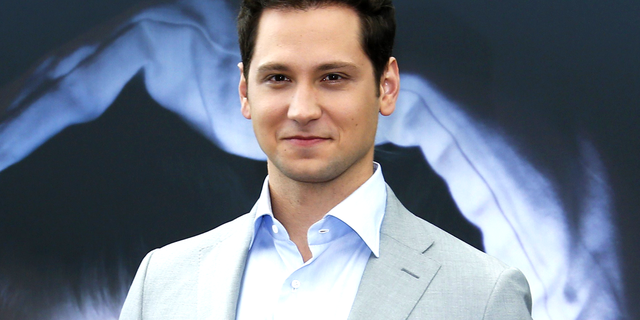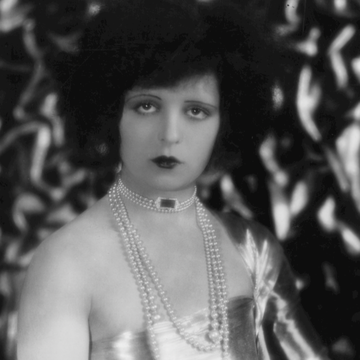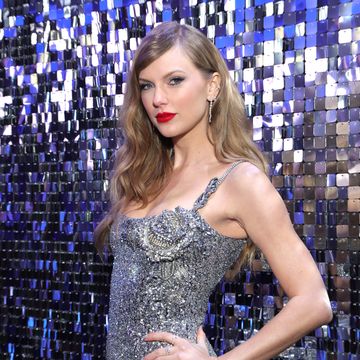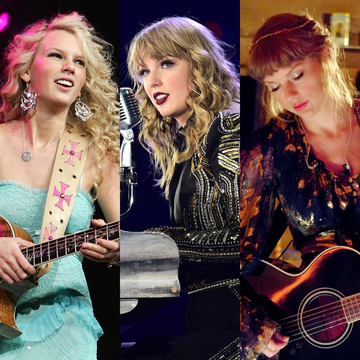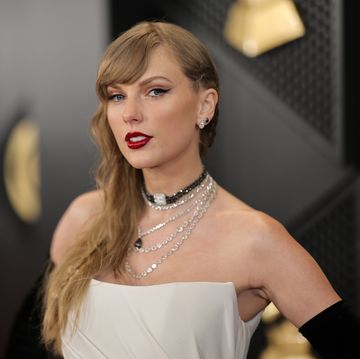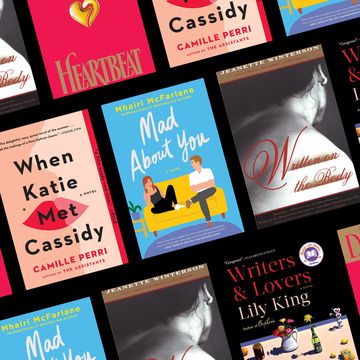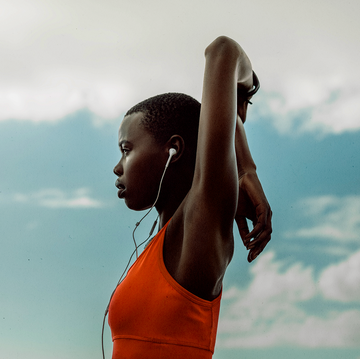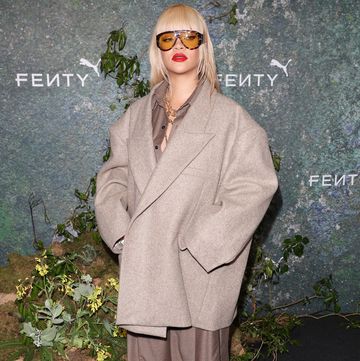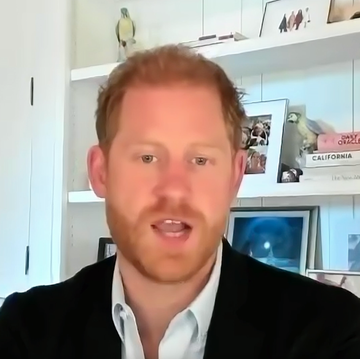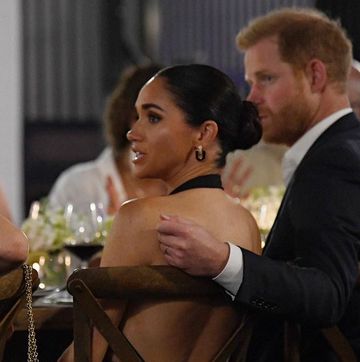Just one year after falling in love with feminism, Matt McGorry has become one of the most visible male feminist celebrities in media today. He dug into Piers Morgan for being sour over Beyoncé's Lemonade, has raised funds for pro-choice group NARAL, and routinely schools internet trolls on intersectional feminism and Black Lives Matter. He's achieved "woke bae" status, but not without controversy. Some find it hard to overlook the fact that in just a year of learning about a mass, multi-generational movement, the fresh actor is already hobnobbing with the likes of Gloria Steinem and taking over a conversation that should be led by women, LGBT people, and people of color. Upon the eve of the Ms. Foundation's Gloria Awards, of which McGorry was an after-party host, Cosmopolitan.com wanted to get McGorry's take on how straight, white, male feminists can be better allies — and perhaps just as importantly, how to spot one of those less well-intentioned male feminists of Tinder.
Do you think that, in some ways, it's easier or perceived as cooler for a man to be a feminist than for a woman?
Yeah. I do. I think it's easier to occur to women to be feminists, but I think it's easier to be one as a man. I've had my feelings hurt a lot because I like to think I'm doing good work and I like to think I'm a good person, [but] sometimes people might disagree with what I'm doing or how I'm doing it — people who are within the movement — and that's hurtful. But it's also important for me to hear those voices no matter how it's said and to take it in and really weigh it out. Also, I wouldn't say I get more praise from people who would normally be attacking women for it — I would say they might go less hard on me and they would threaten me less. But it's not like misogynistic men are like, "Oh, you're a feminist, that's really cool." You know what I mean? Other feminist women are supporting other feminist women. Some feminist women support me and some don't; probably the majority [do], maybe? Hopefully? If not, I'm probably doing something wrong.
Give me an example of a time when you were corrected on your feminism and how you responded.
There was a project called Get Cliterate. It was about how the clit is essentially another version of the penis but we don't talk about it ever, in big part because of the stigma around women's sexuality and how it's shamed. And I made a post for that. I said every woman with a clit deserves an orgasm as much as every man with a penis. And some people called me out and were like, "This is not inclusive, it's transphobic — not every man has a penis, not every woman has a clit. And some have vice versa." And at the time I was like, "Fuck, I can't win. What can I say that will ever be right?" But I talked to a really smart friend of mine, and she was like, "Well, they aren't wrong. So the question is really, How inclusive do you want to be?" You have a platform to show that you can be more inclusive in that way; it ultimately doesn't hurt you once you've learned that lesson and you know how to adjust. The response shouldn't be super-defensive. It should be like, "Where is the value in what they are saying? And is that true?" And it was true. And I just changed it and said every person with a clit deserves an orgasm just as every person with a penis. It's a simple adjustment but it's more inclusive.
Women who come out as feminists or criticize sexism are faced with rape threats, death threats, and harassment. Do you receive any threats?
You know, the threats against women, the level of violence is not really thrown at me. Most of the things men who are against feminism say to me, I don't really consider insults. Like, I understand that if you're a man who is wrapped up in toxic masculinity and what you think it means to be a man, then these things would be insults to you. But like, some guy was like, "You're gay and you can't grow a beard." And I was like, well, I'm not gay, but it's not an insult to me. It would be like, "Your shirt is brown." No, it's green, but OK. And I can't really grow a beard that well. I have a fucking spotty beard and I don't really care. That's not how I value my self-worth.
My mom is Jewish and I'm technically Jewish and someone called me a Jew once and I thought that was interesting, like no one has ever like called me a Jew in a derogatory way. But yeah, the stuff that I get is not nearly as bad [as what women deal with]. And I get a lot of praise for saying the things I'm saying and I understand how that would upset some people. I feel like I might be upset if I was a person of color or a woman. I can imagine that every time I'm getting positive grace for this, it might remind people of the difference in how people of privilege are treated versus people who aren't [of privilege] are treated. Because in an ideal world, I wouldn't be getting the positive praise for it. Because it wouldn't be a rare thing.
Hollywood continues to have a major diversity problem. If there is a producer or project that just strikes you as sexist, even if that is unintentional, is that something you would reconsider in the context of your feminism and anti-racism?
Yeah. I think it kinda has to be a conversation. Playing a misogynistic character, for example, is not a problem to me, but it being a misogynistic project is a problem to me. So for example, my character [Asher] on How to Get Away With Murder, we sort of know he is the problematic one, but it's through a lens of basically everyone else on the show knows that. If you look at like, American Pie — it was on recently in a bar I was in — and the fact that they are all filming this woman naked on her webcam without her knowing, that's fucked up. And the perspective of the film doesn't portray that as [messed up].
If I had an opportunity to be in an enormous project with someone whose few points I didn't agree on but that could elevate my status more, to have more of a voice for these issues — and it would also give me the financial security to not have to worry about losing my ability to pick and choose jobs that would allow me to, again, speak out about these issues — that's something to weigh out too. If I had $10 million in the bank, I would say whatever the fuck I want because I would never have to worry about eating again. But the truth is that I'm still relatively new to this industry and I still don't get to say all the things I would want to say in a public sphere and call people out sometimes in a way that I would want to. I don't want to pretend that I'm completely fearless.
There are a lot of dudes on Tinder who use feminism just to try to sleep with women. [Editor's note: Cosmopolitan.com editor Lane Moore is the creator of the Male Feminists of Tinder Tumblr.] How do women discern between these guys, and men who are actually committed to feminism?
I haven't quite tested this in theory, but I think it's a pretty good theory: Look at how intersectional their feminism is. So if you're going on this date, ask about his issues. If all he's talking about is women, and he's not talking about trans people or has no knowledge or interest in that or the spectrum of gender, that's telling. If he has no understanding of race or class issues or ableism, that's a probably pretty good sign that his feminism is made to get laid. If your feminism stops at women — and when we say women, we say default "white women" — and the man has no interest in trying to parse apart what it might mean to be a woman of color versus a white woman or a trans woman or a trans woman of color, I'd say that's a pretty big red flag. It is probably about getting praise.
Follow Prachi on Twitter.
